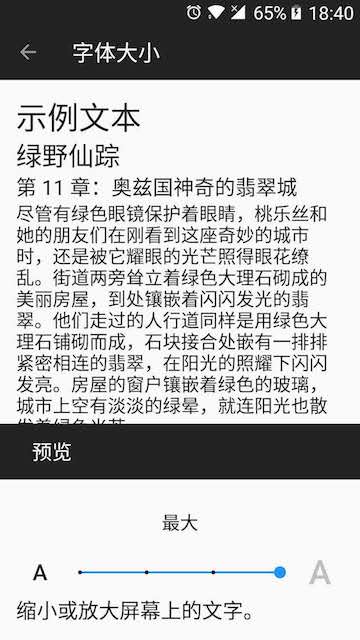在手机系统设置中,若是修改了字体大小,会影响 app 内字体显示,导致布局混乱不齐。有两种方法,一般推荐第二种方法。
方法一:
字体大小单位使用 dp,而不是使用 sp。注意在 java 代码中需要用 dp 方式显示。默认是使用 sp。
tv.setTextSize(TypedValue.COMPLEX_UNIT_DIP, 30); // 注意!!是TypedValue.COMPLEX_UNIT_DIP
为什么呢?我们刚学 android 时,不是说字体大小用 sp,布局大小用 dp 吗?
别急,下面看看字体设置的源码:
public static float applyDimension(int unit, float value,
DisplayMetrics metrics){
switch (unit) {
case COMPLEX_UNIT_PX:
return value;
case COMPLEX_UNIT_DIP:
return value * metrics.density;
case COMPLEX_UNIT_SP:
return value * metrics.scaledDensity;
case COMPLEX_UNIT_PT:
return value * metrics.xdpi * (1.0f/72);
case COMPLEX_UNIT_IN:
return value * metrics.xdpi;
case COMPLEX_UNIT_MM:
return value * metrics.xdpi * (1.0f/25.4f);
}
return 0;
}
可以发现,dp 和 sp 的区别就是density和scaledDensity。下面再看看两者的区别:
/**
* The logical density of the display. This is a scaling factor for the
* Density Independent Pixel unit, where one DIP is one pixel on an
* approximately 160 dpi screen (for example a 240x320, 1.5"x2" screen),
* providing the baseline of the system's display. Thus on a 160dpi screen
* this density value will be 1; on a 120 dpi screen it would be .75; etc.
*
* This value does not exactly follow the real screen size (as given by
* {@link #xdpi} and {@link #ydpi}, but rather is used to scale the size of
* the overall UI in steps based on gross changes in the display dpi. For
* example, a 240x320 screen will have a density of 1 even if its width is
* 1.8", 1.3", etc. However, if the screen resolution is increased to
* 320x480 but the screen size remained 1.5"x2" then the density would be
* increased (probably to 1.5).
*
* @see #DENSITY_DEFAULT
*/
public float density;
/**
* A scaling factor for fonts displayed on the display. This is the same
* as {@link #density}, except that it may be adjusted in smaller
* increments at runtime based on a user preference for the font size.
*/
public float scaledDensity;
简单说,就是density不会受到用户配置的影响,而scaledDensity除了会受到用户配置的影响,其它方面是跟density一致的。
终于真相大白!因此使用 sp 单位时字体大小会受到用户配置系统字体的影响。
方法二:(推荐)
在 activity 内重写getResources方法,如此在 xml 和 java 代码使用 sp 字体单位都是正常的。一般在BaseActivity内重写。
/**
* 设置 app 字体不随系统字体设置改变
*/
@Override
public Resources getResources() {
Resources res = super.getResources();
if (res != null) {
Configuration config = res.getConfiguration();
if (config != null && config.fontScale != 1.0f) {
config.fontScale = 1.0f;
res.updateConfiguration(config, res.getDisplayMetrics());
}
}
return res;
}
注意!网上很多地方写着使用config.setToDefaults();,实际上除了影响 app 内字体大小,还会影响很多地方的属性值。我们来看一下源码:
/**
* Set this object to the system defaults.
*/
public void setToDefaults() {
fontScale = 1;
mcc = mnc = 0;
mLocaleList = LocaleList.getEmptyLocaleList();
locale = null;
userSetLocale = false;
touchscreen = TOUCHSCREEN_UNDEFINED;
keyboard = KEYBOARD_UNDEFINED;
keyboardHidden = KEYBOARDHIDDEN_UNDEFINED;
hardKeyboardHidden = HARDKEYBOARDHIDDEN_UNDEFINED;
navigation = NAVIGATION_UNDEFINED;
navigationHidden = NAVIGATIONHIDDEN_UNDEFINED;
orientation = ORIENTATION_UNDEFINED;
screenLayout = SCREENLAYOUT_UNDEFINED;
uiMode = UI_MODE_TYPE_UNDEFINED;
screenWidthDp = compatScreenWidthDp = SCREEN_WIDTH_DP_UNDEFINED;
screenHeightDp = compatScreenHeightDp = SCREEN_HEIGHT_DP_UNDEFINED;
smallestScreenWidthDp = compatSmallestScreenWidthDp = SMALLEST_SCREEN_WIDTH_DP_UNDEFINED;
densityDpi = DENSITY_DPI_UNDEFINED;
seq = 0;
}
因此,我们只需要把fontScale属性值设置成默认值1即可。一开始我也没考虑到这个点,感谢sollian在评论留言的提醒。
总结
- 若是想要全局控制字体是否受系统设置影响,推荐使用方法二重写
getResources方法。 - 若是部分字体不需要受系统设置影响,部分字体需要受系统设置影响,推荐使用方法一。
